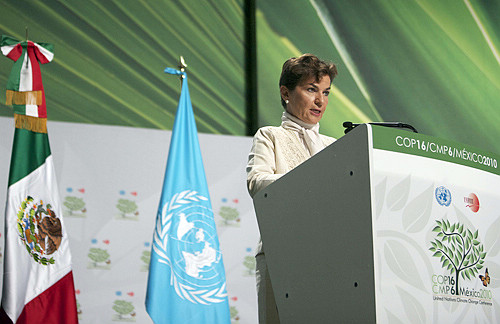|
 |
|
Christiana Figueres, Executive Secretary of the UN Framework Convention on Climate Change (UNFCCC), addresses the opening session of the United Nations Climate Change Conference (COP-16) in Cancun on November 29 (XINHUA) |
The United Nations Climate Change Conference (COP 16) kicked off in the Mexican resort city of Cancun on November 29 and is scheduled to conclude on December 10. The focus of the conference is a two-track negotiating process aimed at enhancing long-term international climate change cooperation amid growing worries about global warming.
The conference will also include the sixth session of the Conference of the Parties serving as the Meeting of the Parties to the Kyoto Protocol (COP/MOP 6).
In addition, two special working groups under the UN Framework Convention on Climate Change (UNFCCC) and its Kyoto Protocol will meet side-by-side to seek consensus on climate change issues.
The Ad Hoc Working Group on Long-Term Cooperative Action Under the Convention, made up of all 194 parties to the UNFCCC, was tasked with delivering a long-term global approach to climate change. The Ad Hoc Working Group on Further Commitments for Annex I Parties Under the Kyoto Protocol met in parallel to discuss the emissions reduction commitments for the 37 industrialized countries that have ratified the Kyoto Protocol for the period beyond 2012.
During the summit's opening session, Mexican President Felipe Calderón cited last year's hurricane in Mexico, this year's floods in Pakistan and fires in Russia as examples of increasing incidences of natural disasters brought about by climate change.
Calling on negotiators in Cancun to make progress in dealing with climate change, he said that the "eyes of the world" were focused on the meeting.
UNFCCC Executive Secretary Christiana Figueres said several governments had agreed that a balanced set of decisions under both the Convention and the Kyoto Protocol could be achieved in Cancun. At the same time, a number of politically charged issues would still need to be resolved in order to reach such an outcome, she said.
"When the stakes are high and issues are challenging, compromise is an act of wisdom that can unite different positions in creative ways. I am convinced that governments can compromise to find their way to a concrete outcome," said Figueres. "That outcome needs to be both firm and dependable and have a dedicated follow-on process for future work," she added.
Close to 15,000 participants, including government delegates from the 194 Parties to the UNFCCC, representatives from business and industry, environmental organizations and research institutions are attending the two-week summit.
(Reporting from Cancun, Mexico) | 